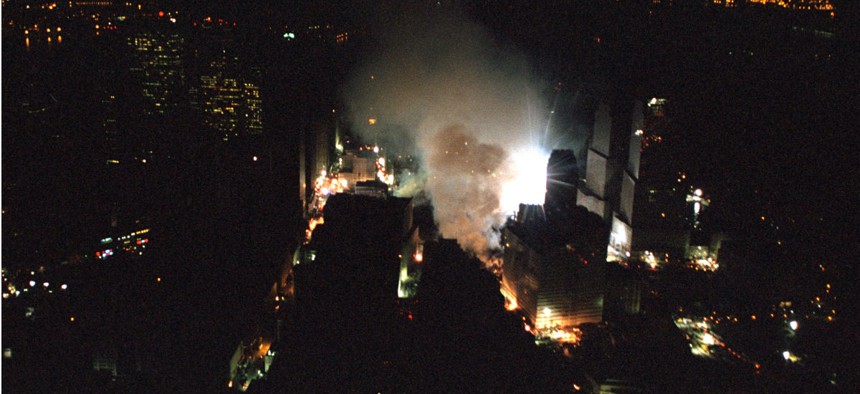
The World Trade Center rescue site in New York City is seen the evening of Friday, Sept. 14, 2001, from Marine One. George W. Bush Library
From the Archive: The 9/11 Attacks
During one of the nation's darkest hours, federal employees rose to the occasion.
The 9/11 terrorist attacks continue to reverberate 15 years later. As the National Commission on Terrorist Attacks Upon the United States put it in their final report: “September 11, 2001, was a day of unprecedented shock and suffering in the history of the United States. The nation was unprepared.”
Military personnel and federal employees felt that unpreparedness as deeply as any Americans. Through 15 years of war, the creation of the Homeland Security Department and the overhaul of intelligence operations, the nation’s vulnerability remains a central concern. But before any of that—before the endless Congressional hearings about government failures, the recriminations and regrets, the deployments to Afghanistan and Iraq—there was a coming together for a common purpose. For many government workers and military personnel, the duties were both professional and personal. First, there was the search for survivors in the rubble of lower Manhattan and at the Pentagon, the accounting for missing colleagues. And then there was the mission itself.
We’ve pulled two stories from the archives of Government Executive that describe what it was like for some of those who were there. People like Matthew Morris, a power generator shop supervisor at the Pentagon who groped his way through smoke-filled hallways to get to a critical electrical vault so he could shut down four 13,800-volt circuit breakers. “He took his life in his hands to do that," his co-worker, John Robinson, told Government Executive. The force of the crash and resulting explosion had blown the metal doors and a wall out of the vault. The electricity flowing through the system was so powerful it took tremendous strength for Morris to shut down the huge breakers on his own, Robinson says. “If he hadn't done that, a lot of us probably wouldn't be here.”
In New York, Michael Mabee, a discrimination investigator at the Occupational Safety and Health Administration office in lower Manhattan, returned to the crash site to help set up a field hospital after escaping the scene and accounting for his colleagues.
There were many heroes on Sept. 11. These are the stories of just a few of them.
Pulling Together: At the Pentagon, generals and privates, executives and laborers found themselves side by side on a front line none could previously have imagined.
Horror, Then a Helping Hand: In New York, federal employees fled for their lives, then pitched in to help.







